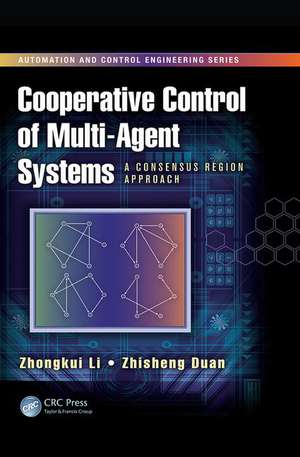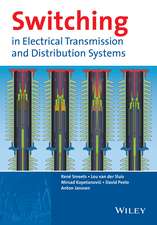Cooperative Control of Multi-Agent Systems: A Consensus Region Approach: Automation and Control Engineering
Autor Zhongkui Li, Zhisheng Duanen Limba Engleză Paperback – 29 mar 2017
Beginning with an introduction to cooperative control and graph theory, this monograph:
- Explores the consensus control problem for continuous-time and discrete-time linear multi-agent systems
- Studies the H∞ and H2 consensus problems for linear multi-agent systems subject to external disturbances
- Designs distributed adaptive consensus protocols for continuous-time linear multi-agent systems
- Considers the distributed tracking control problem for linear multi-agent systems with a leader of nonzero control input
- Examines the distributed containment control problem for the case with multiple leaders
- Covers the robust cooperative control problem for multi-agent systems with linear nominal agent dynamics subject to heterogeneous matching uncertainties
- Discusses the global consensus problem for Lipschitz nonlinear multi-agent systems
| Toate formatele și edițiile | Preț | Express |
|---|---|---|
| Paperback (1) | 618.36 lei 6-8 săpt. | |
| CRC Press – 29 mar 2017 | 618.36 lei 6-8 săpt. | |
| Hardback (1) | 1467.26 lei 6-8 săpt. | |
| CRC Press – 29 oct 2014 | 1467.26 lei 6-8 săpt. |
Din seria Automation and Control Engineering
-
 Preț: 386.02 lei
Preț: 386.02 lei - 20%
 Preț: 751.17 lei
Preț: 751.17 lei -
 Preț: 317.35 lei
Preț: 317.35 lei - 31%
 Preț: 433.47 lei
Preț: 433.47 lei - 18%
 Preț: 1330.48 lei
Preț: 1330.48 lei - 18%
 Preț: 1144.56 lei
Preț: 1144.56 lei - 15%
 Preț: 542.20 lei
Preț: 542.20 lei -
 Preț: 422.59 lei
Preț: 422.59 lei - 26%
 Preț: 1577.16 lei
Preț: 1577.16 lei - 15%
 Preț: 489.26 lei
Preț: 489.26 lei - 8%
 Preț: 460.07 lei
Preț: 460.07 lei - 18%
 Preț: 1339.62 lei
Preț: 1339.62 lei - 26%
 Preț: 874.36 lei
Preț: 874.36 lei - 18%
 Preț: 1325.92 lei
Preț: 1325.92 lei - 26%
 Preț: 428.70 lei
Preț: 428.70 lei - 18%
 Preț: 1108.37 lei
Preț: 1108.37 lei - 15%
 Preț: 461.03 lei
Preț: 461.03 lei - 18%
 Preț: 1054.58 lei
Preț: 1054.58 lei - 31%
 Preț: 767.57 lei
Preț: 767.57 lei - 38%
 Preț: 331.87 lei
Preț: 331.87 lei - 38%
 Preț: 331.87 lei
Preț: 331.87 lei - 35%
 Preț: 408.36 lei
Preț: 408.36 lei - 18%
 Preț: 1229.15 lei
Preț: 1229.15 lei - 18%
 Preț: 1125.42 lei
Preț: 1125.42 lei - 26%
 Preț: 456.63 lei
Preț: 456.63 lei - 53%
 Preț: 207.71 lei
Preț: 207.71 lei - 30%
 Preț: 931.61 lei
Preț: 931.61 lei - 18%
 Preț: 1668.41 lei
Preț: 1668.41 lei - 29%
 Preț: 1194.39 lei
Preț: 1194.39 lei - 27%
 Preț: 428.70 lei
Preț: 428.70 lei - 29%
 Preț: 1190.72 lei
Preț: 1190.72 lei - 9%
 Preț: 620.15 lei
Preț: 620.15 lei - 29%
 Preț: 1100.25 lei
Preț: 1100.25 lei - 18%
 Preț: 1344.22 lei
Preț: 1344.22 lei - 15%
 Preț: 456.50 lei
Preț: 456.50 lei - 18%
 Preț: 784.81 lei
Preț: 784.81 lei - 18%
 Preț: 1305.87 lei
Preț: 1305.87 lei - 18%
 Preț: 1223.61 lei
Preț: 1223.61 lei - 35%
 Preț: 408.36 lei
Preț: 408.36 lei
Preț: 618.36 lei
Preț vechi: 772.95 lei
-20% Nou
Puncte Express: 928
Preț estimativ în valută:
118.33€ • 126.53$ • 98.66£
118.33€ • 126.53$ • 98.66£
Carte tipărită la comandă
Livrare economică 18 aprilie-02 mai
Preluare comenzi: 021 569.72.76
Specificații
ISBN-13: 9781138073623
ISBN-10: 1138073628
Pagini: 262
Ilustrații: 50
Dimensiuni: 156 x 234 x 14 mm
Greutate: 0.45 kg
Ediția:1
Editura: CRC Press
Colecția CRC Press
Seria Automation and Control Engineering
ISBN-10: 1138073628
Pagini: 262
Ilustrații: 50
Dimensiuni: 156 x 234 x 14 mm
Greutate: 0.45 kg
Ediția:1
Editura: CRC Press
Colecția CRC Press
Seria Automation and Control Engineering
Cuprins
Introduction and Mathematical Background. Consensus Control of Linear Multi-Agent Systems: Continuous-Time Case. Consensus Control of Linear Multi-Agent Systems: Discrete-Time Case. H∞ and H2 Consensus Control of Linear Multi-Agent Systems. Consensus Control of Linear Multi-Agent Systems Using Distributed Adaptive Protocols. Distributed Tracking of Linear Multi-Agent Systems with a Leader of Possibly Nonzero Input. Containment Control of Linear Multi-Agent Systems with Multiple Leaders. Distributed Robust Cooperative Control for Multi-Agent Systems with Heterogeneous Matching Uncertainties. Global Consensus of Multi-Agent Systems with Lipchitz Non-Linear Dynamics. Bibliography.
Recenzii
"... offer[s] a systematic framework for designing distributed controllers for multi-agent systems having linear agent dynamics. ... This monograph is certainly for a specialist in multi-agent systems. It will be useful to researchers and to advanced course control engineers where multi-agent systems are covered. It’s useful as a reference text and it has a good bibliography."
—Control Technology Consortium (ACTC) E-News, May 2015 Edition
—Control Technology Consortium (ACTC) E-News, May 2015 Edition
Notă biografică
Zhongkui Li holds a BS from the National University of Defense Technology, Changsha, China and a Ph.D from Peking University, Beijing, China. He is currently an assistant professor in the Department of Mechanics and Engineering Science, College of Engineering, Peking University, China. Previously he was a postdoctoral research associate at the Beijing Institute of Technology, and held visiting positions at City University of Hong Kong, China and Nanyang Technological University, Singapore. He was the recipient of the Natural Science Award (First Prize) from the Ministry of Education of China in 2011 and the National Excellent Doctoral Thesis Award of China in 2012. His article (coauthored with Z.S. Duan and G.R. Chen) received the 2013 IET Control Theory & Applications Premium Award (Best Paper).
Zhisheng Duan holds an MS from Inner Mongolia University, Hohhot, China, and a Ph.D from Peking University, Beijing, China. He is currently a Cheung Kong scholar at Peking University, and is with the Department of Mechanics and Engineering Science, College of Engineering. Previously he was a postdoctor with Peking University; a visiting professor with Monash University, Melbourne, Australia; and a visiting professor with City University of Hong Kong, China. He has been the recipient of the Chinese Control Conference Guan Zhao-Zhi Award and the Natural Science Award (First Prize) from the Ministry of Education of China. He obtained the outstanding National Natural Science Foundation in China, and was selected into the Program for New Century Excellent Talents in Universities by the Ministry of Education of China. He has published over 100 papers in, and been an associate editor and advisory board member of, numerous international referred journals and conferences.
Zhisheng Duan holds an MS from Inner Mongolia University, Hohhot, China, and a Ph.D from Peking University, Beijing, China. He is currently a Cheung Kong scholar at Peking University, and is with the Department of Mechanics and Engineering Science, College of Engineering. Previously he was a postdoctor with Peking University; a visiting professor with Monash University, Melbourne, Australia; and a visiting professor with City University of Hong Kong, China. He has been the recipient of the Chinese Control Conference Guan Zhao-Zhi Award and the Natural Science Award (First Prize) from the Ministry of Education of China. He obtained the outstanding National Natural Science Foundation in China, and was selected into the Program for New Century Excellent Talents in Universities by the Ministry of Education of China. He has published over 100 papers in, and been an associate editor and advisory board member of, numerous international referred journals and conferences.
Descriere
This book provides a systematic framework for designing distributed controllers for multi-agent systems with general linear agent dynamics, linear agent dynamics with uncertainties, and Lipschitz nonlinear agent dynamics. The proposed consensus region decouples the design of the feedback gain matrices of the cooperative protocols from the communication graph and serves as a measure for the robustness of the protocols to variations of the communication graph. By exploiting the decoupling feature, adaptive cooperative protocols are presented that can be designed and implemented in a fully distributed fashion.









